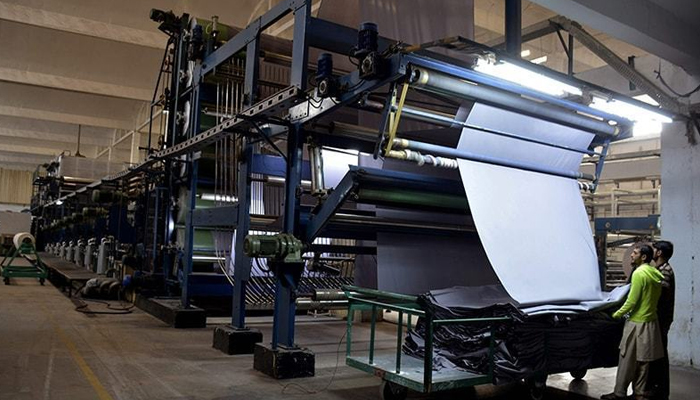Textile industry hails PM over payment of Rs65bn pending refunds
In the absence of any mechanism for rehabilitation, the investment of billions of rupees is turning into scrap
FAISALABAD: The textile export industry has hailed the government’s move to release Rs65 billion for payment of all verified pending refunds of exporters till March 03, 2024.
This is a welcome move by the prime minister, which will definitely boost the confidence of exporters and encourage the export sector, it said.
Patron-in-Chief, Pakistan Textile Exporters Association, Khurram Mukhtar, expressed the hope that the same spirit will be followed for payment of remaining refunds of sales tax deferred, DDT/DLTL, TUF and markup subsidy.
Currently, an amount of Rs50 billion is ready for payment with SBP on account of DDT, TUF and markup subsidy whereas approximately Rs250 billion are stuck with FBR on account of sales tax deferred, income tax, income tax credit and duty drawback.
Highlighting the adverse impact of high interest rates on industrialisation, he called for urgent measures to alleviate the cost of establishing new industries. He pointed out that due to tough economic challenges, a sizeable textile capacity has been converted into non-functional.
In the absence of any mechanism for rehabilitation, the investment of billions of rupees is turning into scrap.
He urged the new government to evolve a comprehensive policy to make idle units operative, fetch an extra $1.5 billion forex and generate more than 200,000 new jobs.
PTEA’s patron-in-chief was of the view that the country desperately needs to boost exports to narrow its ballooning trade deficit, which has surged to $30.18 billion during the July-February period of the current fiscal year.
He expressed the hope that economic managers of the new government would forge pragmatic policies for sustainable economic growth.
-
 Nicole Kidman Celebrates Galentine’s Day Months After Keith Urban Split
Nicole Kidman Celebrates Galentine’s Day Months After Keith Urban Split -
 Justin Bieber Unveils Hailey Bieber As First Face Of SKYLRK In Intimate Campaign Debut
Justin Bieber Unveils Hailey Bieber As First Face Of SKYLRK In Intimate Campaign Debut -
 Caitlin O’Connor Says Fiance Joe Manganiello Has Changed Valentine’s Day For Her
Caitlin O’Connor Says Fiance Joe Manganiello Has Changed Valentine’s Day For Her -
 Rachel Zoe Sends Out Message For Womne With Her Post-divorce Diamond Ring
Rachel Zoe Sends Out Message For Womne With Her Post-divorce Diamond Ring -
 James Van Der Beek's Final Conversation With Director Roger Avary Laid Bare: 'We Cried'
James Van Der Beek's Final Conversation With Director Roger Avary Laid Bare: 'We Cried' -
 Jaden Smith Walks Out Of Interview After Kanye West Question At Film Premiere
Jaden Smith Walks Out Of Interview After Kanye West Question At Film Premiere -
 Why Halle Berry Wasn't Ready For Marriage After Van Hunt Popped Question? Source
Why Halle Berry Wasn't Ready For Marriage After Van Hunt Popped Question? Source -
 Michelle Obama Gets Candid About Spontaneous Decision At Piercings Tattoo
Michelle Obama Gets Candid About Spontaneous Decision At Piercings Tattoo -
 Bunnie Xo Shares Raw Confession After Year-long IVF Struggle
Bunnie Xo Shares Raw Confession After Year-long IVF Struggle -
 Brooks Nader Reveals Why She Quit Fillers After Years
Brooks Nader Reveals Why She Quit Fillers After Years -
 Travis Kelce Plays Key Role In Taylor Swift's 'Opalite' Remix
Travis Kelce Plays Key Role In Taylor Swift's 'Opalite' Remix -
 How Jennifer Aniston's 57th Birthday Went With Boyfriend Jim Curtis
How Jennifer Aniston's 57th Birthday Went With Boyfriend Jim Curtis -
 JoJo Siwa Shares Inspiring Words With Young Changemakers
JoJo Siwa Shares Inspiring Words With Young Changemakers -
 James Van Der Beek Loved Ones Breaks Silence After Fundraiser Hits $2.2M
James Van Der Beek Loved Ones Breaks Silence After Fundraiser Hits $2.2M -
 Disney’s $336m 'Snow White' Remake Ends With $170m Box Office Loss: Report
Disney’s $336m 'Snow White' Remake Ends With $170m Box Office Loss: Report -
 Travis Kelce's Mom Donna Kelce Breaks Silence On His Retirement Plans
Travis Kelce's Mom Donna Kelce Breaks Silence On His Retirement Plans




